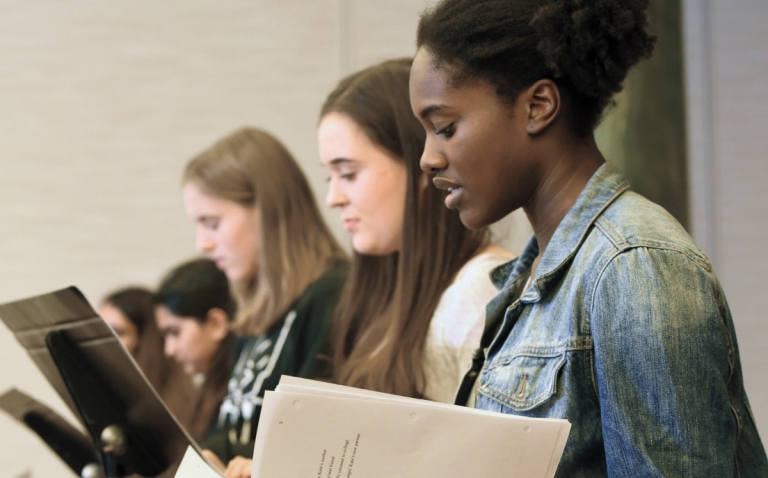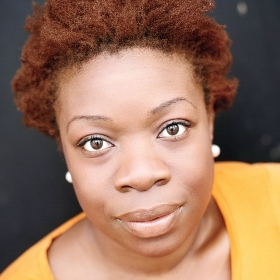On a dark November night, students and faculty members munched on Linden Store deli sandwiches in the brightly lit Alumnae Hall ballroom while students took turns reading parts from scripts. Diego Arciniegas and Lois Roach, both senior lecturers in theatre studies, and Marta Rainer ’98, director of theatre and theatre studies, took notes and chatted with the students about the scripts and their performances.
The ritual of casting a production is as old and familiar as Alumnae Hall itself, but this particular session was in preparation for an ambitious new experiment in collaboration for the theatre department: the Wellesley College Theatre Studies Showcase. This end-of-semester event would feature students from Arciniegas’s Introduction to Acting class performing works written by students in Roach’s The Art of Playwriting course. They were to use sets dreamed up by students in Janie Howland’s course, Scenic Design as a Collaborative Art, and built by David Towlun and his stagecraft students. Also in the mix would be comedians from Rainer’s Women in Comedy class, program notes written by student dramaturges in Melinda Lopez’ class Women, Center Stage, and lights and sound managed by student techs.
Roach selected six short student pieces for the showcase, which varied widely in their subject matter, mood, and style. They included Stall Mates, a short comic piece by Chiara Seoh ’19 about a miscommunication that unfolded in a Chili’s bathroom; Johnny’s Diner, an eerie and campy piece by Michelle Atwood ’19 about a restaurant where something strange is afoot; and Charlestown High by Karina Ithier ’20, a piece about a new English as Second Language teacher’s evolving relationships with her high-school students, featuring overlapping, rapid-fire slam-poetry-like monologues.
Having students, often new to acting, perform in pieces written by other students, also new to playwriting, presented some compelling challenges. Usually, when Arciniegas is developing playwrights, he believes in casting the most seasoned actors to give the playwright feedback. And when he’s teaching actors, he has them perform work by the most experienced playwrights, so the actors are clear on what they’re trying to honor. But he found that there was so much raw talent in the playwrights’ work that it hasn’t been an issue for his actors. Additionally, he says, “Because we’re in an academic setting, I feel much more freedom to fail than in a professional theater. And that allows me to model that kind of risk-taking for them, as well as asking them to do it.”

For Tatenda Rameau ’20 (above, front), preparing for her role in Charlestown High as Valcourt, a 17-year-old immigrant from Haiti who gradually opens up to his teacher and ultimately suffers a tragic fate, was challenging and very personal. “The first time I read the script, I cried. So when I got cast as him, I knew it was going to be a hard role for me to do,” she says. As a Caribbean American with a Jamaican father and a Haitian mother, “growing up I did not see a lot of Haitian characters on TV, so I knew this could be the first and last time I get to play a Haitian character. So that was extra drive to commit to being him, along with my usual drive as an actor,” she says.
Karina Ithier ’20 wrote Charlestown High, but has more experience on the stage than as a playwright. She was moved by Rameau’s reaction to her work. “I was shocked and surprised to know that theater, even written for a class, can be a recreation of real life and has the ability to tell people’s stories that have not necessarily been told to a wider audience,” she says. “I was also surprised by how seeing a work on stage as a writer is different than an actor—as an actor, I am less nervous.”
When the showcase began, in front of a packed crowd in the Ruth Nagel Jones Theatre during reading period last semester, Continuing Education playwright Sarah Lord, a ’20 Davis Scholar who is an American studies and theatre studies double major, was nervous, too. “But midway through, I found myself so engrossed by the performances onstage that I almost forgot that this was something that I’d written. It didn’t feel like it was mine anymore because the director, actors, and designers made it their own,” she says. “And that kind of collaboration is exactly what I love the most about working in the theater. Every person brings something to the table to make the project bigger and better than any one person could do alone.”









We ask that those who engage in Wellesley magazine's online community act with honesty, integrity, and respect. (Remember the honor code, alums?) We reserve the right to remove comments by impersonators or comments that are not civil and relevant to the subject at hand. By posting here, you are permitting Wellesley magazine to edit and republish your comment in all media. Please remember that all posts are public.